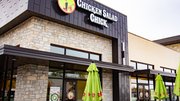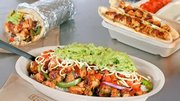Article
Is it possible to deliver fine dining experience for $10?
Frank Klein, CEO of Asian Box, thinks it's possible. The Asian concept sources sustainable ingredients, makes its own sauces and butchers its own meat.

October 7, 2014 by Brenda Rick Smith — Editor, Networld Media Group
Here's the irony of being a restaurant consultant: when you are on the road advising clients on how to make their restaurants top-notch eateries, just about the last thing you feel like doing at the end of the day is sitting through the grind of a fine three-course meal.
But that's how industry veteran Frank Klein, CEO of FK Restaurants & Hospitality, felt.
Klein and business partner Chad Newton took that desire for a fast, fine meal, married it to passion for authentic Vietnamese and Thai flavors, and Asian Box was born.
"We're a lifestyle Asian fast casual brand focusing on high-quality, sustainably grown food at an affordable price," said Klein, who serves as CEO of the two year old concept. "We want to bring that fine dining sensibility into the $10 price point."
The fine dining sensibility shows up in Asian Box's selection and treatment of ingredients. Asian Box sources sustainably-grown, locally-produced ingredients whenever possible, butchers its own meat and makes its own sauces, according to Klein.
The fine dining sensibility also shows up in Asian Box's Executive Chef Grace Nguyen, whose previous gigs include a stint at Charles Phan's Slanted Door eatery. Nguyen created Asian Box's menu, much of which is inspired by her upbringing in a traditional Vietnamese family.
While Klein said he and his partners have broad palettes, Asian flavors hold particular appeal.
"Asian food is explosively flavorful and wonderful," said Klein. "It's something you can eat every day. There's a massive amount of variety."
Asian Box currently has four units up and running: three in Northern California, and one in Burbank, California. A fifth location is underway for Los Angeles.
People-driven strategy
The goal for the brand is to roll out nationally, said Klein, but not until the right people are in place.
"We can do good food, and we can find good real estate everywhere," said Klein. "We're people driven. When we feel like we have a good team in place, we will venture into those new markets. People are everything to us and our business."
Asian Box people are corporate trained, but entrepreneurially minded, according to Klein. They are disciplined and have the ability to create a good culture and train staff to get the right results.
"We're not Chipotle," said Klein. "We've got to convince people that we really know what we're doing and to join our team."
Employee welfare
Employee welfare also plays a role in Asian Box's brand values, and competitive pay and flexible scheduling options are two key elements.
Asian Box pays competitively to attract the best local talent, said Klein, averaging fifty percent above minimum wage. Employees earn bonuses, incentives and awards.
"We've never paid close to minimum wage since the day we opened," said Klein.
Employees are cross-trained extensively, in part so they can work a variety of positions and get the hours they need.
"We tell everybody that we want you to stick around as long as you want to stick around, even if you want to work just one shift a week," said Klein. "Happier employees mean a happier Asian Box. Anyone who is not doing that today is foolish."
Supply chain
Finding the right suppliers could be a challenge as Asian Box expands across the country, but Klein is optimistic. While there are distributors in California that only deal with sustainable producers, that might not be the case everywhere right now, but things are changing.
"The good thing about the fast casual industry is that we're creating the demand and building the market," he said.
Consumers are driving demand, too.
"Most businesses coming online will have a different contract with their consumer, that they are going to serve products that are sustainably and ethically grown," he said. "If you're not doing that, you're going to be left behind."
Klein is seeing markets develop in places like Denver, the District of Columbia and the northeast where sustainable sourcing is available and consumer demand is strengthening.
Restaurants – particularly smaller operations with 30 units or less -- can encourage the movement by teaming up with competitors to support local farmers.
"The scrappy small start ups are finding wonderful opportunities to work together to create wonderful opportunities for the local farmers," said Klein.
 ChatGPT
ChatGPT Grok
Grok Perplexity
Perplexity Claude
Claude












